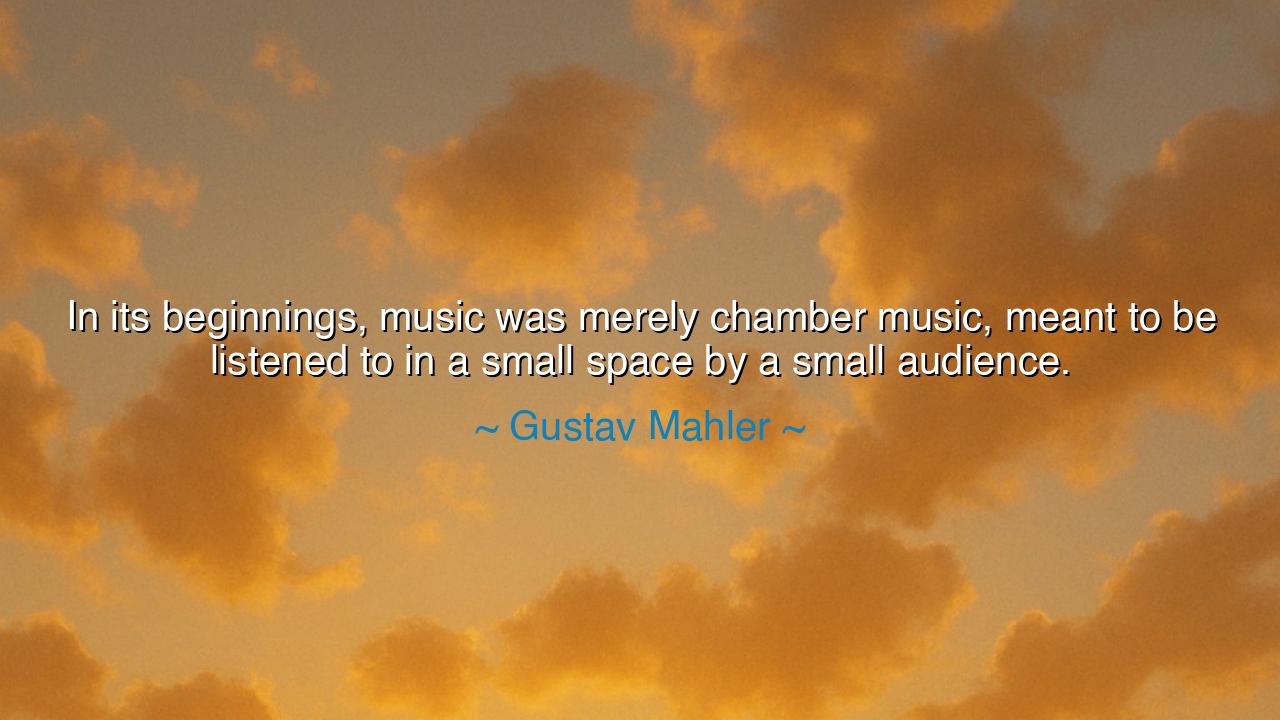
In its beginnings, music was merely chamber music, meant to be
In its beginnings, music was merely chamber music, meant to be listened to in a small space by a small audience.






Hear the words of Gustav Mahler, master of the symphony and prophet of sound, who declared: “In its beginnings, music was merely chamber music, meant to be listened to in a small space by a small audience.” This truth he spoke is not a dismissal of music’s power, but a reminder of its humble birth. For before the great concert halls, before the thundering orchestras, before the grand stages, music was intimate—woven of strings and voices, echoing within chambers, meant not for multitudes but for a few gathered souls. It was a communion, a sacred whisper between player and listener, carried in the stillness of small rooms.
The origin of this thought lies in the history of art itself. In the courts of kings and the houses of nobles, chamber music was born, crafted not for spectacle but for closeness. The lute in the corner, the violin in the hands of a friend, the harpsichord by candlelight—these were the roots from which the mighty tree of music grew. Mahler, though he himself wrote symphonies vast and cosmic, knew that the heart of music was first nurtured in quiet spaces, where its meaning could be deeply felt by those few who listened with attentive hearts.
Consider the tale of Joseph Haydn, often called the father of the symphony and the string quartet. In the palace of Esterházy, far from the crowds of Vienna, he wrote music for his patron’s private chambers. His quartets were played in small rooms, with only a handful of listeners present. Yet it was in that intimate soil that the genius of his music flourished. What began as private art for a few became the foundation for works that would one day fill the grand halls of Europe. Thus we see: from the small chamber grows the vast cathedral of sound.
Yet Mahler’s words speak not only of history, but of the very nature of creativity. All things begin small, humble, hidden. The grand symphonies of life are born first as whispers, the vast movements as single notes. Just as music began in chambers, so too do ideas, inventions, and revolutions begin in the private spaces of the mind or the quiet gatherings of a few. To dismiss the small is to forget the seed from which greatness springs.
But there is also wisdom here for the listener. In this age, we are accustomed to music as spectacle, to sound magnified until it shakes the very earth. Yet there remains a unique power in intimacy, in the quiet of a small room where every note, every breath, every silence is felt. The heart is touched differently when music is not a storm upon the crowd, but a conversation between souls. Mahler reminds us to seek not only grandeur, but also simplicity, to listen not only with the ear but with the heart.
The lesson, therefore, is clear: cherish the beginnings. Do not despise the smallness of your own craft, whether it is a song sung to a few, a story told to friends, or a dream whispered only to yourself. From the chamber comes the symphony; from the seed, the forest; from the humble beginning, the greatness that endures. If you wait for the vast stage before creating, you may never begin. But if you honor the small space, the small audience, your art may one day echo across centuries.
Therefore, O listener, live with this wisdom: create where you are, with what you have, for whomever is near. Whether in a small chamber or in the expanse of the world, let your song be true. For as Mahler teaches, music in its beginnings was not about size, but about sincerity. Let your beginnings, too, be sincere, and in time they may become vast. And if they remain small, know this: even a single note, played with truth, can outlast the silence of ages.






AAdministratorAdministrator
Welcome, honored guests. Please leave a comment, we will respond soon